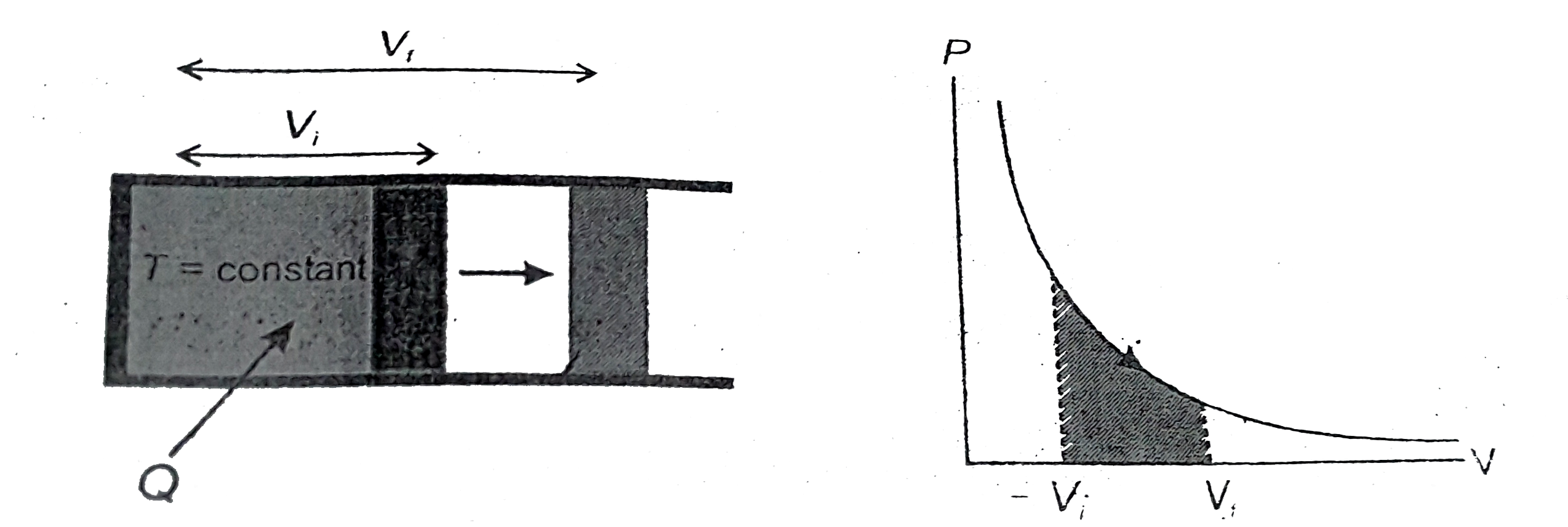A 0.5 mole of gas at temperature 300 K expands isothermally from an initial volume of 2 L to 6 L
(a) What is the work done by the gas?
(b) Estimate the heat added to the gas?
(c) What is the final pressure of the gas?
(The value of gas constant, R=8.31 J mol−1K−1)

(a) We know that work done by the gas in an isothermal expansion
Since μ=0.5
W=0.5mol×8.31Jmol K×300Kln(6L2L),W=1.369kJ
Note the W is positive since the work is done by the gas.
(b) From the First law of thermodynamics, in an isothermal process the heat supplied is spent to do work.
Therefore, Q=W=1.369kJ. Thus Q is also positive which implies that heat flows in to the system.
(c) For an isothermal process PiVi=PfVf=μRT
Pf=μRTVf=0.5mol×8.31Jmol. K×300K6×10−3m3=207.75kPa.
Topper's Solved these Questions
- HEAT AND THERMODYNAMICSBOOK - FULL MARKSCHAPTER - HEAT AND THERMODYNAMICSEXERCISE - TEXTUAL EVALUATION SOLVED (I. Multiple Choice Questions)
13 Videos
- HEAT AND THERMODYNAMICSBOOK - FULL MARKSCHAPTER - HEAT AND THERMODYNAMICSEXERCISE - TEXTUAL EVALUATION SOLVED (II. Short Answer Questions)
48 Videos
- GRAVITATIONBOOK - FULL MARKSCHAPTER - GRAVITATIONEXERCISE - ADDITIONAL QUESTIONS SOLVED (Numerical Problems)
18 Videos
- KINEMATICSBOOK - FULL MARKSCHAPTER - KINEMATICSEXERCISE - ADDITIONAL QUESTIONS SOLVED (LONG ANSWER QUESTIONS)
10 Videos
Similar Questions
3 mole of a gas at temperature 400 K expands isothermally from initial volume of 4 litre to final volume of 8 litre. Find the work done by the gas. (R=8.31Jmol−1K−1)
View Solution2 mol of an ideal gas at 27∘C expand isothermally and reversibly
from a volume of 2L to 20L. The work done (in KJ) by the gas is :-
View Solution
Knowledge Check
If 1.5 L of an ideal gas at a apressure of 20 atm expands isothermally and reversibly to a final volume of 15 L, the work done by the gas in L atm is:
A69.09B34.55C−34.55D−69.092 mol of an ideal gas at 27∘C expand isothermally and reversibly from a volume of 4L to 40L. The work done (in KJ) by the gas is :-
Aw=−28.72KJBw=−11.488KJCw=−5.736KJDw=−4.988KJOne mole of an ideal gas at 300 K is expanded isothermally from an initial volume of 1 L to 10 L. The ΔE for this process is (R=2 cal . mol−1K−1)
A163.7calBzeroC1381.1calD9lit. Atm
One mole of an ideal gas is expanded from a volume of 3L to 5L under a constant pressure of 1 atm. Calculate the work done by the gas.
View SolutionOne mole of an ideal gas at 300 K expands isothermally and reversibly from 5 to 20 litres. Calculate the work done and heat absorbed by the gas.
View SolutionA cylinder contains 0.50 mol of an ideal gas at temperature of 310 K. as the gas expands isothermally from an initial volume of 0.31 m3 to a final volume of 0.45m3, find the amount of heat that must be added to the gas in order to maintain a constant temperature.

View SolutionA cylinder contains 0.50 mol of an ideal gas at temperature of 310 K. as the gas expands isothermally from an initial volume of 0.31 m3 to a final volume of 0.45m3, find the amount of heat that must be added to the gas in order to maintain a constant temperature.

View SolutionInitial volume of a gas is 1L at temperature 100K. What is the volume of a gas at 300K.
View Solution
